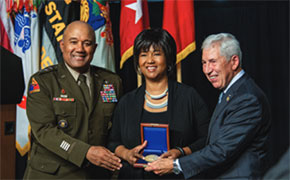Dr. Mae C. Jemison Receives 2021 Thayer Award

While introducing Dr. Mae C. Jemison, the 2021 Sylvanus Thayer Award recipient, to the Corps of Cadets on October 7, 2021, Lieutenant General Darryl Williams ’83, the 60th U.S. Military Academy Superintendent, quoted poet Maya Angelou: “‘The desire to reach for the stars is ambitious. The desire to reach hearts is wise.’ Dr. Mae Jemison has the distinction of having done both: touching the stars—and, more importantly—touching hearts and minds.” [SEE PHOTOS]
Since 1958, the Thayer Award has been awarded annually to an outstanding U.S. citizen whose character and accomplishments exemplify personal devotion to the West Point motto, “Duty, Honor, Country.” A former NASA astronaut, Jemison has received national recognition for her pioneering work of integrating science with art and culture to solve problems and foster innovation.
Before the award ceremony, Jemison visited the Superintendent’s Conference Room to speak with West Point cadets from the Black and Gold Forum, the Margaret Corbin Forum, and other selected cadets interested in science and medicine. During each session, as well as in her speech to the entire Corps that evening, Jemison mentioned a mantra she carried with her throughout her time at NASA that continues to guide her today: “purpose.”
“I kept the word ‘purpose’ in front of my desk at NASA because I needed to understand and remind myself all the time that my purpose of having gone to NASA was because I wanted to fly in space,” Jemison told cadets. “It may sound strange to say, but I didn’t want to be an ‘astronaut’ because people see this role as synonymous with ‘flying in space.’ But the astronaut was a position at the job. My purpose there was I wanted to fly in space. I wanted to make contributions. And I reminded myself so that I didn’t lose focus on what I was doing. I didn’t get sidetracked because somebody might want me to do something different. So, I think when you’re looking at your vision, ask ‘What is your purpose?’”
Jemison also spoke to cadets about leadership, something she has experience in not only as an astronaut but as a medical doctor, engineer, social scientist, educator and dancer. After earning a Bachelor of Science degree in Chemical Engineering from Stanford University, as well as fulfilling the requirements for a Bachelor of Arts degree in African and Afro-American studies, she earned her Doctor of Medicine degree from Cornell Medical School. Jemison then joined the Peace Corps and served as a medical officer for two years in Sierra Leone and Liberia.
On September 12, 1992, Jemison launched into space on the Space Shuttle Endeavor with six other astronauts, after being one of the few selected to join NASA Astronaut Group 12. The voyage made Jemison the first African American woman in space.
“In order to be a leader, you have to recognize that you don’t know everything,” Jemison told cadets, “and if you don’t know how to follow, it’s very difficult to get other people to follow you. You have to be a good follower. I know that I don’t always have to be the one in charge—that doesn’t mean giving up my responsibility. But it means sometimes letting other people take point, because they can do a better job on this than I can.”
She told cadets that just because they might not be the one in charge, that doesn’t mean they can’t change the dynamics of a situation.
After serving as an astronaut with NASA for six years, Jemison began her career as a STEM educator, teaching at Dartmouth College, followed by serving as Professor-at-Large at Cornell University. Currently, she leads the 100 Year Starship project, a global initiative that aims to ensure that human space travel to another star is possible within the next 100 years and to enhance life on Earth.
Jemison told cadets that seeing their integrity and enthusiasm throughout the day’s events, which included a review of the Corps of Cadets assembled in formation on the Plain in her honor, inspired her and made her want to do better.
“They’re talking about what everybody says, ‘We want to get back to normal,’” Jemison said to a forum of cadets. “What normal? We all have to discover how we evolve to a better normal? We don’t want to go back to the way things were. We have more to do. People will tell you, ‘Hey, we’re waiting for the young folks to come save the world.’ Don’t let us off the hook. You will do what you need to do and have those new visions, move things forward. But don’t let the generation that’s there now off the hook. We have to do better too.”
Jemison stressed to the Corps that the past 18 months have been very different for so many Americans who have been bombarded with challenges, including the COVID-19 pandemic, the social justice movement, the insurrection at the U.S. Capitol by fellow U.S. citizens, the effects of climate change and a widening wealth gap. According to Jemison, these challenges will require not just cadets’ intellect but their empathy, compassion and a commitment to caring.
“Time is limited but it has infinite possibilities. There are 86,400 seconds in each day, and we can do with each of those seconds exactly as we please, but we can never get a single one of those seconds back,” Jemison said. “It’s what we decide to do with our time and the choices that make our time infinite with possibilities.”
West Point Magazine - Winter 2022
Author Erika Norton